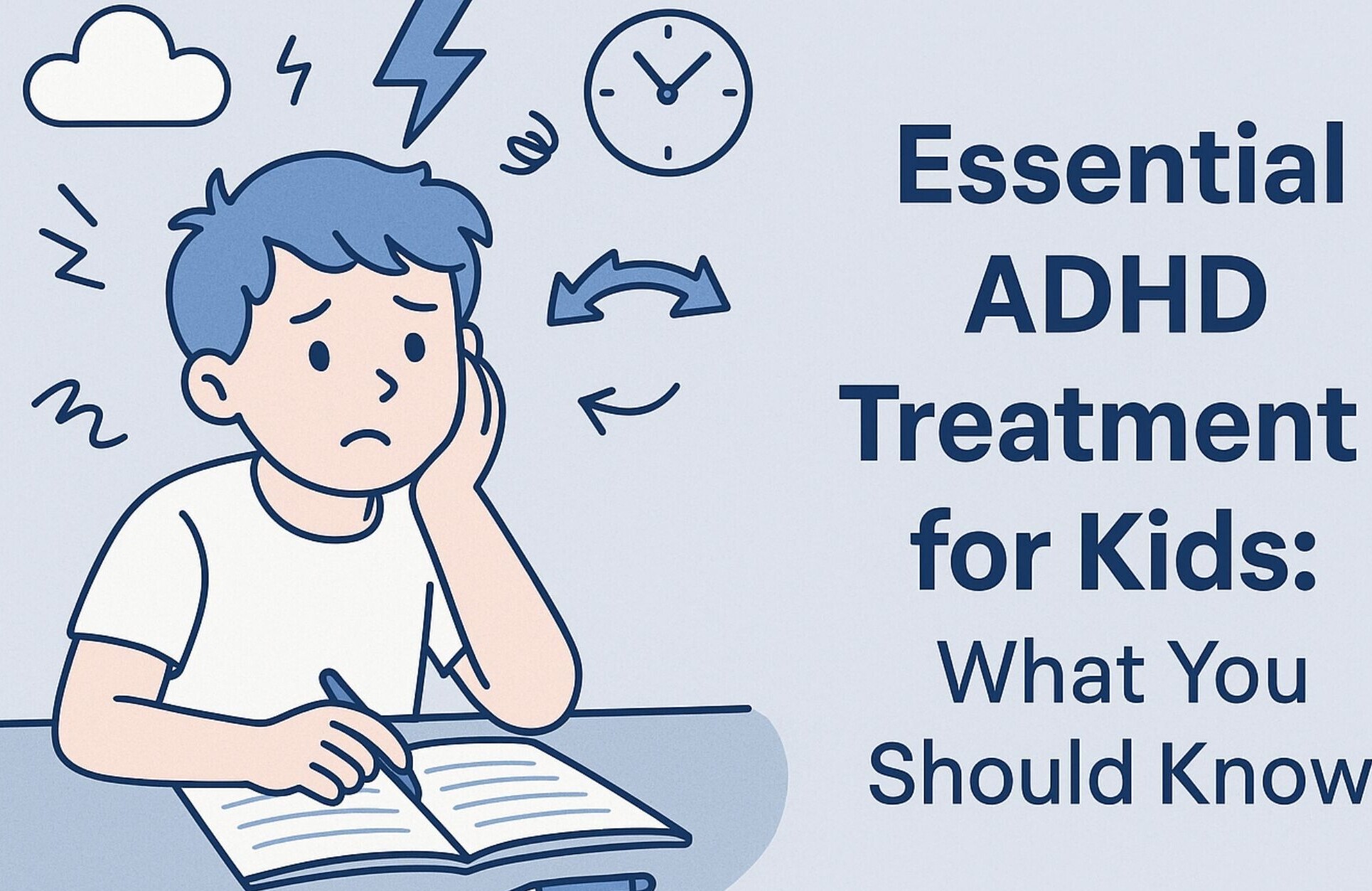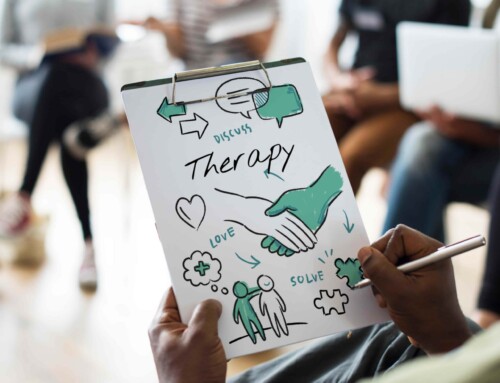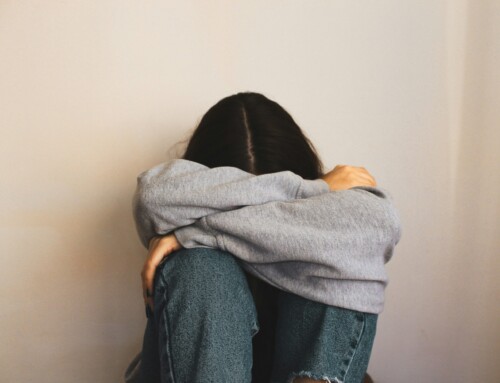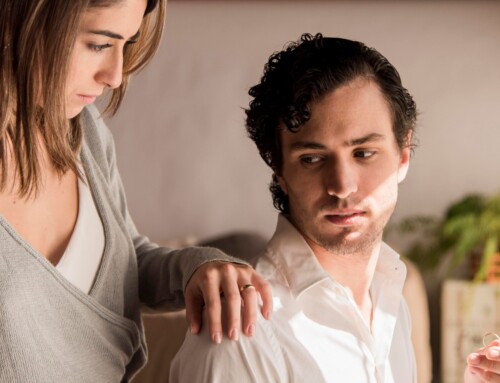Essential ADHD Treatment For Kids: What You Should Know?
TL;DR
|
|---|
Every parent wonders at some point if their child’s restlessness, forgetfulness, or impulsive energy is “just a phase” or something more.
Attention Deficit Hyperactivity Disorder (ADHD) is one of the most common neurodevelopmental and mental health disorders in childhood. According to the National Library of Medicine, 6 million children ages 3 to 17 years ever diagnosed in the United States.
At Total Life Counseling, we often meet parents unsure if their child is going through a phase or needs professional help. We walk with families and offer them with the right ADHD treatment for kids.
In this blog, we’ll explore the essential ADHD treatments available for kids, from therapy and medication to lifestyle shifts and school-based support, so you feel empowered to make informed choices for your child.
Why Early Treatment Of ADHD Matters?
Getting help for ADHD early can make a world of difference. ADHD isn’t just about being a little restless or distracted. If left untreated, it can create bigger challenges at school, at home, and in friendships. The sooner kids get the right support, the sooner they can build healthy coping skills that stick with them for life.
Without early treatment, young children may:
- Struggle with low self-esteem
- Fall behind academically
- Have trouble making or keeping friends
- Face a higher risk factors like anxiety, depression, or even oppositional defiant disorder (which affects up to half of kids with the combined ADHD type if left untreated)
So, what should parents look out for? Some key red flags include:
- Constant fidgeting or restlessness
- Acting impulsively beyond what’s typical for their age
- Difficulty staying focused on tasks
- Seeming “not to listen” even when spoken to directly
If these core symptoms of ADHD show up not just at home, but also in school and social settings, it’s a strong sign that professional support is needed.
Early ADHD diagnosis and treatment not only calm symptoms but also strengthen life skills such as planning, organizing, and managing impulses, critical executive functions for lifelong success.
Don’t face this journey alone. Book a session with our ADHD specialists and start building the right support for your child.
What Are The Best ADHD Treatment Options For Kids?
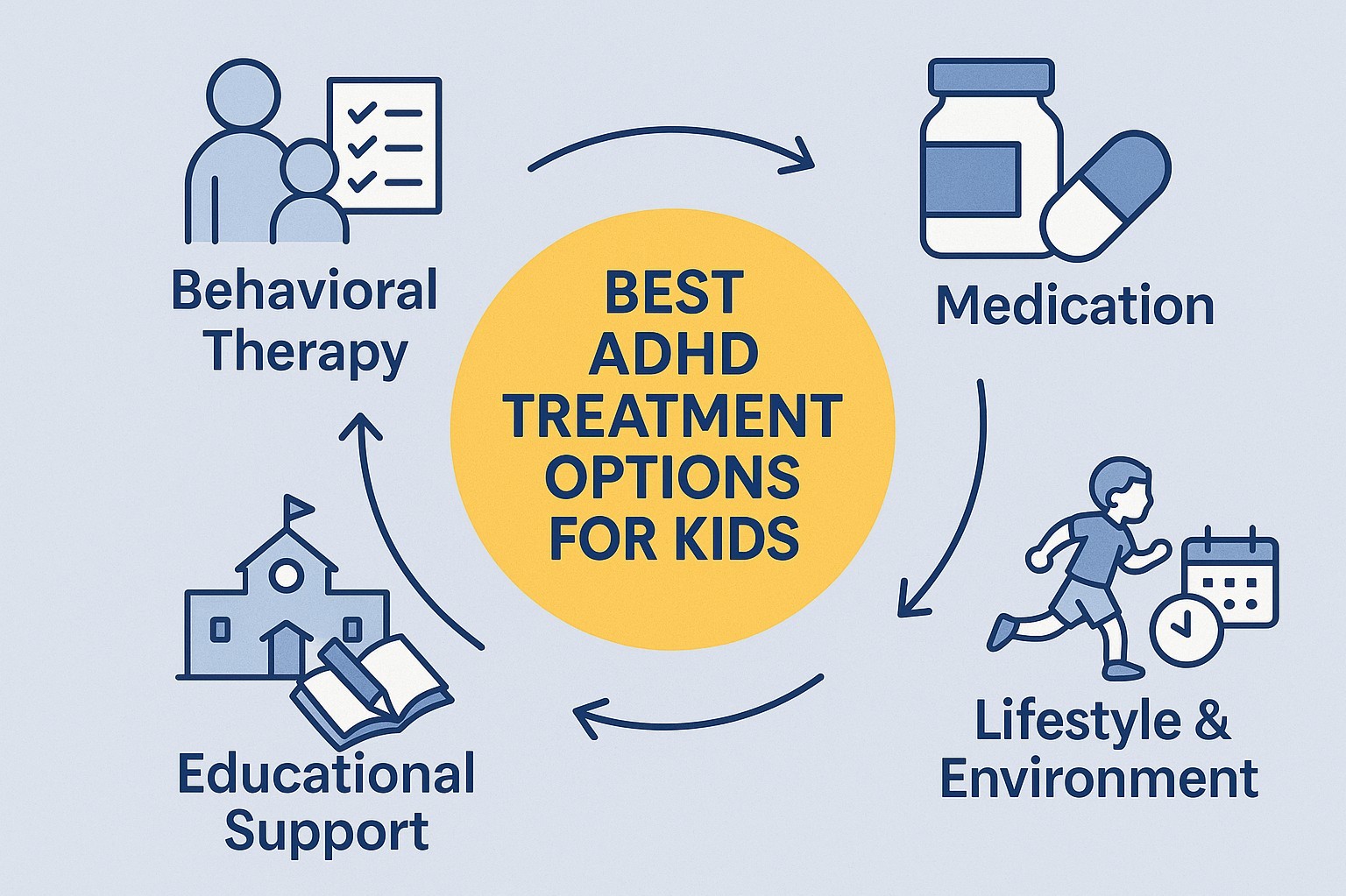
Every child with ADHD is different, which means their treatment plan should be too. From lifestyle changes to professional therapies, there are several proven ways to help kids manage severe symptoms and thrive.
Let’s take a closer look at these options:
1. Behavioral Therapy
Behavioral therapy is a highly effective treatment that focuses on changing actions and building skills. Instead of just treating symptoms, these behavioral interventions teach children how to manage their problem behaviors and develop positive habits.
The core idea is to reinforce desired behaviors and reduce unwanted ones through a structured system.
For children with ADHD, this therapy helps improve organizational skills, social interactions, and self-control. Parent training programs are a crucial component, as they teach caregivers how to apply these techniques consistently at home.
According to the American Academy of Pediatrics, the approach is based on three principles:
- Set specific goals: Clearly define what behavior needs to change.
- Provide rewards and consequences: Use positive reinforcement for good behavior and consistent consequences for unwanted actions.
- Maintain consistency: Apply these rules consistently over time to shape behavior effectively.
Through this process, children learn practical skills that can help them succeed in various settings. This type of therapy empowers both the child and the family members to actively manage the challenges of ADHD.
2. Medication Treatment Options
When behavioral therapy alone isn’t enough, doctors may recommend medication. Stimulants such as Ritalin or Adderall are the most common. Also, research by the National Library of Medicine shows that 70–80% of children show fewer symptoms while taking the stimulant medications. They work by boosting brain chemicals that improve focus and self-control.
Non-stimulants are another option. They may take longer to work but often provide steadier results. Medication should always be carefully monitored by a doctor, as it can affect blood pressure and sleep patterns.
Here’s a table that outlines the different medication treatment options:
|
Medication Class |
Examples |
Potential Side Effects |
|---|---|---|
|
Stimulants |
Methylphenidate (Ritalin, Concerta), Mixed Amphetamine Salts (Adderall) |
Loss of appetite, sleep problems, irritability, weight loss |
|
Non-Stimulants |
Atomoxetine (Strattera), Guanfacine (Intuniv) |
Fatigue, upset stomach, dizziness, mood swings |
Remember, medication is a tool, not a cure. Finding the right type and dose takes time, and regular doctor check-ins are essential to track progress and manage side effects such as appetite loss, sleep problems, or irritability.
3. Lifestyle & Environmental Support
Supporting a child with ADHD involves more than just therapy or medication; environmental factors play a huge role. Creating a structured and supportive home life can significantly help manage symptoms.
These lifestyle strategies are also examples of ADHD treatment for kids without medication, showing that non-medication approaches can be powerful too.
Exercise boosts brain chemicals that control attention and focus, similar to how stimulant medications work. Encouraging at least 30 minutes of play outside each day can also be beneficial. Key environmental supports include:
- Creating a routine: A consistent daily schedule for meals, homework, and bedtime helps children know what to expect.
- Organizing the home: Designating specific places for belongings like schoolbags and toys can reduce lost items and morning chaos.
- Good nutrition and adequate sleep are also critical.. Limiting screen time before bed and ensuring a regular bedtime can lead to vast improvements.
When applied together, these small but steady changes can help manage hyperactivity symptoms and impulsive behavior at home.
Some parents also wonder if challenges in school could be connected to family history. Learn more in our post: Is ADHD Genetic?
4. Educational Support
The school environment can be challenging for a child with attention deficit, but the right educational support makes a world of difference. Schools can be a key part of the treatment plan by providing accommodations and interventions that help your child succeed academically and socially.
Working with your child’s teachers and school officials is essential. You can develop an Individualized Education Program (IEP) or a 504 plan, which outlines specific supports.
For older children, this might include training in organizational skills to help them manage more complex assignments and schedules. Improving social skills is another important area where schools can help. Helpful educational strategies include:
- Behavioral classroom interventions: Teachers can use a system of rewards to encourage positive behavior, like raising a hand before speaking.
- Instructional support: This can include preferential seating to minimize distractions or breaking down large assignments into smaller steps.
These supports help children stay on track and build confidence in their ability to learn. Consistent communication between home and school ensures that strategies are reinforced in all settings.
Every child deserves understanding. Sign up for the ADHD masterclass and discover how parents and teachers can create a nurturing environment together.
Can Natural & Holistic Approaches Help Kids With ADHD?
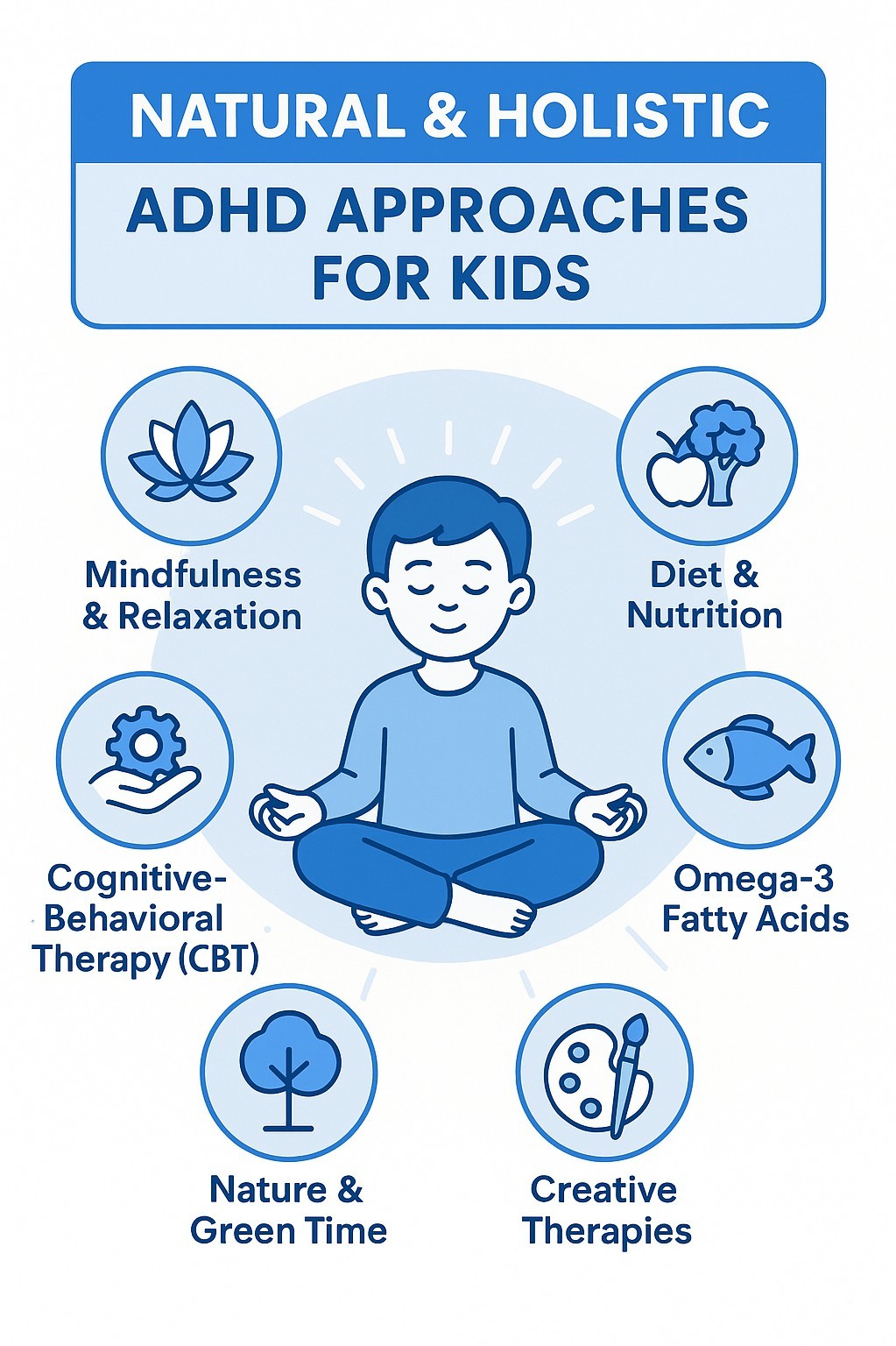
Parents often ask if there are safe, natural ADHD treatment for kids. The answer is Yes.
While holistic approaches aren’t a cure, they can play an important role in helping kids feel calmer, more focused, and more confident.
Let’s explore some holistic approaches that many families find helpful in supporting children with ADHD:
1. Calm The Mind With Mindfulness & Relaxation
Simple practices like deep breathing, yoga, or short guided meditations can help children slow down and feel more in control of their emotions. Over time, mindfulness can teach kids how to pause before reacting impulsively and manage stress in healthier ways.
2. Build Everyday Skills With Cognitive-Behavioral Therapy (CBT)
CBT is a structured type of therapy that gives kids practical tools for everyday challenges. A therapist might teach them how to break big tasks into smaller steps, manage frustration, or reframe negative thoughts. These skills build self-awareness and confidence over time.
3. Fuel Focus Through Diet & Nutrition
Food can influence mood, focus, and energy. A balanced diet with fruits, vegetables, whole grains, and lean proteins helps stabilize energy and attention. Some parents notice improvements when reducing processed foods, sugar, or artificial additives. Nutrients like iron, zinc, magnesium, and omega-3s may also play a role in supporting brain health.
4. Boost Brain Health With Omega-3 Fatty Acids
Omega-3s, found in foods like salmon, walnuts, and chia seeds (or through fish oil supplements), are linked to better focus and reduced impulsivity. Adding more of these healthy fats to a child’s diet can support brain development and attention.
5. Harness the Power of Nature & “Green Time”
Spending time outdoors has been shown to reduce ADHD symptoms. Activities like biking, hiking, or simply playing in the park can calm restless energy and improve focus. Even 20–30 minutes of outdoor play can make a noticeable difference in mood and attention.
6. Spark Growth Through Creative Therapies
Art, music, or play therapy provide positive outlets for children to express themselves and build confidence. Whether it’s painting, learning an instrument, or role-playing, these activities encourage focus, patience, and emotional growth in a fun and engaging way.
These approaches fit within holistic ADHD treatment for kids and can serve as safe ADHD alternative treatment for kids when paired with professional guidance.
Some families also consider ADHD homeopathic treatment for kids, though scientific evidence remains limited, so it is best to consult a pediatrician before exploring these remedies.
Also Read: Is ADHD a disability, or simply a different way of thinking?
How Can Parents & Caregivers Support Kids With ADHD?
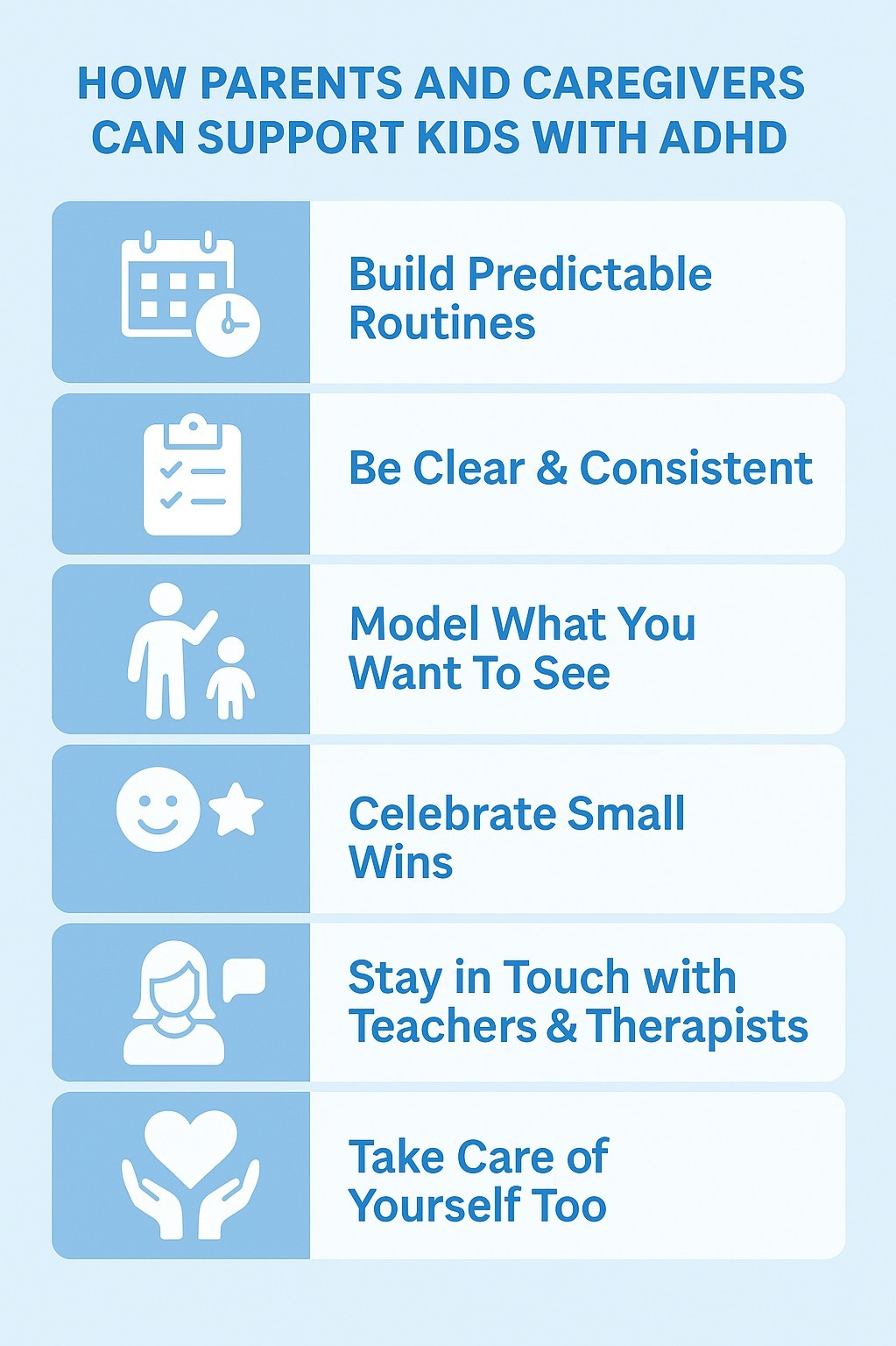
Parents and caregivers are at the heart of a child’s ADHD journey. Doctors and therapists may provide guidance, but it is the support at home that shapes how well treatment works. The way you create structure, respond to challenges, and encourage progress can make a lasting difference.
Let’s look at some practical ways parents and caregivers can make daily life easier and support their child’s growth:
1. Build Predictable Routines
Children with ADHD do best when life feels structured and predictable. Setting regular times for meals, homework, play, and bedtime helps reduce anxiety and makes daily transitions smoother. For example, if your child knows homework always comes after a snack, the routine becomes easier to follow and less of a battle.
Families dealing with sensory triggers may also find useful coping techniques in hypersensitivity management for ADHD.
Also read: Practical ways to handle Hypersensitivity in ADHD.
2. Be Clear & Consistent
Simple, specific instructions are much easier for kids with ADHD to follow than vague ones. Instead of saying “Get ready,” try “Please put your shoes by the door.” Consistency is just as important as clarity. When rules and expectations are applied the same way each time, children feel secure and understand what is expected of them.
3. Model What You Want To See
Children watch closely and often copy the behaviors they see. If you want your child to stay calm during frustration, show them how you handle stressful situations. Practice patience, stay organized, and demonstrate problem-solving. Talking through your own calm approach can teach them how to respond in similar ways.
4. Celebrate The Small Wins
Kids with ADHD often hear more corrections than praise, which can lower their confidence. Make it a habit to notice and celebrate even small successes, like finishing homework, waiting their turn, or remembering to raise a hand in class. A simple “Great job finishing your math work” or “I’m proud of how you handled that” can boost motivation and self-esteem.
Also, managing transitions, including family trips, can be challenging for kids with ADHD, and traveling with ADHD offers practical ways to make journeys smoother for the whole family.
5. Stay In Touch With Teachers & Therapists
ADHD treatment is most effective when home and school strategies are aligned. Regular check-ins with teachers, therapists, or coaches help ensure consistency. For example, if a new behavior strategy is introduced at school, reinforcing it at home helps your child succeed across different environments.
6. Take Care Of Yourself Too
Supporting a child with ADHD can be challenging and sometimes overwhelming. Making time for your own well-being, whether through exercise, hobbies, or rest, allows you to recharge. When you feel balanced, you are better equipped to stay patient, calm, and supportive for your child.
How Total Life Counseling Can Support Your Family?
At Total Life Counseling, we understand the challenges of parenting a child with ADHD. Our licensed counselors provide compassionate, evidence-based support to help kids build focus, confidence, and coping skills, while also guiding parents with practical strategies at home and in school.
What sets us apart:
- Personalized care plans for your child’s needs
- Proven therapies like CBT, play therapy, and social skills training
- Parent coaching and school collaboration for consistency
- A supportive, holistic approach for the whole family
You don’t have to face this alone. Contact Total Life Counseling today to take the next step toward helping your child thrive.
Final Thoughts
Parenting a child with ADHD can feel overwhelming at times, and it is normal to wonder if you are doing enough. But remember, your love, patience, and willingness to seek support already make a powerful difference.
Early treatment and consistent care give your child the chance to grow with confidence, discover their strengths, and feel understood. You do not have to walk this path alone.
With the right guidance and support, both you and your child can look forward to a brighter, more hopeful future.
Frequently Asked Questions
Are there natural remedies that can help children with ADHD?
Yes, some natural remedies may help manage the symptoms of ADHD. These include dietary changes like adding omega-3s, ensuring adequate physical activity, and addressing environmental factors. However, always consult a doctor before trying alternative treatments to ensure they are safe and appropriate for your child.
Is ADHD treatment different for younger children than for older kids?
Yes, treatment recommendations vary by age. For younger children, behavior therapy and parent training are the recommended first steps. For older children and adolescents, treatment often combines therapy with ADHD medications to manage the symptoms of hyperactivity and inattention more effectively.
What is ADHD manualized treatment for kids?
It’s a structured, evidence-based program (like parent training or behavioral therapy) that follows a set manual of proven techniques to help children manage ADHD symptoms consistently.
Are there non-medication options available for treating ADHD in kids?
Options include behavioral therapy, parent training, school-based support, lifestyle changes, and holistic approaches like mindfulness, exercise, and nutrition adjustments.
Can ADHD symptoms improve with family or school-based interventions?
Absolutely. Consistent routines, positive reinforcement at home, and school accommodations such as IEPs or 504 plans often lead to noticeable improvements.
Is behavior therapy recommended as a first step for young children with ADHD?
Yes. Experts recommend behavior therapy and parent training as the first-line treatment for preschool and younger children before considering medication.
Share This Story, Choose Your Platform!
Total Life Counseling Center consists of Licensed Counselors, masters level therapists, Español counselors, Licensed Mental Health Counselors, business coaches, and image enhancement coaches who provide counseling for emotional, mental, physical and spiritual care including marriage, individual, family, substance abuse and more. TLC’s family, trauma and marriage experts have been interviewed on National and Local TV/Radio over 200 times for their expert advice on Fox News, OWN, WETV, ABC’s Medical Minute and more. Our skilled counselors are relational, approachable and specialists providing therapy services in the Central Florida area including: Orlando, Winter Park, MetroWest, Windermere, Dr. Phillips, East Orlando, Lake Mary, and Clermont, Boca Raton Florida, and Dallas, TX.

